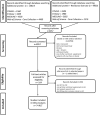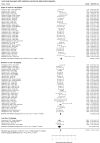Systematic review and meta-analysis of protein intake to support muscle mass and function in healthy adults - PubMed (original) (raw)
Meta-Analysis
. 2022 Apr;13(2):795-810.
doi: 10.1002/jcsm.12922. Epub 2022 Feb 20.
Lauren Colenso-Semple 1, Sean R McKellar 1, Thomas Yau 1, Muhammad Usman Ali 3, Donna Fitzpatrick-Lewis 3, Diana Sherifali 4, Claire Gaudichon 5, Daniel Tomé 5, Philip J Atherton 6, Maria Camprubi Robles 7, Sandra Naranjo-Modad 8, Michelle Braun 9, Francesco Landi 10, Stuart M Phillips 1
Affiliations
- PMID: 35187864
- PMCID: PMC8978023
- DOI: 10.1002/jcsm.12922
Meta-Analysis
Systematic review and meta-analysis of protein intake to support muscle mass and function in healthy adults
Everson A Nunes et al. J Cachexia Sarcopenia Muscle. 2022 Apr.
Abstract
We performed a systematic review, meta-analysis, and meta-regression to determine if increasing daily protein ingestion contributes to gaining lean body mass (LBM), muscle strength, and physical/functional test performance in healthy subjects. A protocol for the present study was registered (PROSPERO, CRD42020159001), and a systematic search of Medline, Embase, CINAHL, and Web of Sciences databases was undertaken. Only randomized controlled trials (RCT) where participants increased their daily protein intake and were healthy and non-obese adults were included. Research questions focused on the main effects on the outcomes of interest and subgroup analysis, splitting the studies by participation in a resistance exercise (RE), age (<65 or ≥65 years old), and levels of daily protein ingestion. Three-level random-effects meta-analyses and meta-regressions were conducted on data from 74 RCT. Most of the selected studies tested the effects of additional protein ingestion during RE training. The evidence suggests that increasing daily protein ingestion may enhance gains in LBM in studies enrolling subjects in RE (SMD [standardized mean difference] = 0.22, 95% CI [95% confidence interval] 0.14:0.30, P < 0.01, 62 studies, moderate level of evidence). The effect on LBM was significant in subjects ≥65 years old ingesting 1.2-1.59 g of protein/kg/day and for younger subjects (<65 years old) ingesting ≥1.6 g of protein/kg/day submitted to RE. Lower-body strength gain was slightly higher by additional protein ingestion at ≥1.6 g of protein/kg/day during RE training (SMD = 0.40, 95% CI 0.09:0.35, P < 0.01, 19 studies, low level of evidence). Bench press strength is slightly increased by ingesting more protein in <65 years old subjects during RE training (SMD = 0.18, 95% CI 0.03:0.33, P = 0.01, 32 studies, low level of evidence). The effects of ingesting more protein are unclear when assessing handgrip strength and only marginal for performance in physical function tests. In conclusion, increasing daily protein ingestion results in small additional gains in LBM and lower body muscle strength gains in healthy adults enrolled in resistance exercise training. There is a slight effect on bench press strength and minimal effect performance in physical function tests. The effect on handgrip strength is unclear.
Keywords: Muscle mass; Muscle strength; Physical function; Protein quantity.
© 2022 The Authors. Journal of Cachexia, Sarcopenia and Muscle published by John Wiley & Sons Ltd on behalf of Society on Sarcopenia, Cachexia and Wasting Disorders.
Conflict of interest statement
Stuart M. Phillips reports that he is an inventor on a patent (WO/2018/157258) held by Exerkine Corporation. Stuart M. Phillips is an unpaid member of the scientific advisory board of Enhanced Recovery™ (https://ersportsdrink.com/). Stuart M. Phillips has received, in the last 5 years, honoraria and travel expenses from the US National Dairy Council, the National Cattlemen's Beef Association, and the US Dairy Export Council. Philip J. Atherton received research funding and/or honoraria for protein nutrition research from Abbott Nutrition, Fresenius‐Kabi, and Ajinomoto Co., Inc. Francesco Landi received financial support from Abbott Nutrition and Nutricia. Maria Camprubi Robles, Michelle Braun, and Sandra Naranjo‐Modad are employees of Abbott Nutrition, International Flavors & Fragrances, and Givaudan, respectively. Everson A. Nunes, Lauren Colenso‐Semple, Sean R. McKellar, Thomas Yau, Muhammad Usman Ali, Donna Fitzpatrick‐Lewis, Diana Sherifali, Claire Gaudichon, and Daniel Tomé declare that they have no conflict of interest.
Figures
Figure 1
Preferred Reporting Items for Systematic Reviews and Meta‐Analysis (PRISMA) flow chart shows the number of studies involved in each systematic search and screening step. Medline: Medical Literature Analysis and Retrieval System Online.
Figure 2
Forest plot showing effects of additional protein ingestion on changes in lean body mass by daily protein ingestion in subjects submitted to resistance exercise training.
Similar articles
- Interventions for promoting habitual exercise in people living with and beyond cancer.
Turner RR, Steed L, Quirk H, Greasley RU, Saxton JM, Taylor SJ, Rosario DJ, Thaha MA, Bourke L. Turner RR, et al. Cochrane Database Syst Rev. 2018 Sep 19;9(9):CD010192. doi: 10.1002/14651858.CD010192.pub3. Cochrane Database Syst Rev. 2018. PMID: 30229557 Free PMC article. - Effect of Resistance Training Frequency on Gains in Muscular Strength: A Systematic Review and Meta-Analysis.
Grgic J, Schoenfeld BJ, Davies TB, Lazinica B, Krieger JW, Pedisic Z. Grgic J, et al. Sports Med. 2018 May;48(5):1207-1220. doi: 10.1007/s40279-018-0872-x. Sports Med. 2018. PMID: 29470825 - Interventions for improving mobility after hip fracture surgery in adults.
Fairhall NJ, Dyer SM, Mak JC, Diong J, Kwok WS, Sherrington C. Fairhall NJ, et al. Cochrane Database Syst Rev. 2022 Sep 7;9(9):CD001704. doi: 10.1002/14651858.CD001704.pub5. Cochrane Database Syst Rev. 2022. PMID: 36070134 Free PMC article. - Effects of Resistance Training Volume on Physical Function, Lean Body Mass and Lower-Body Muscle Hypertrophy and Strength in Older Adults: A Systematic Review and Network Meta-analysis of 151 Randomised Trials.
Radaelli R, Rech A, Molinari T, Markarian AM, Petropoulou M, Granacher U, Hortobágyi T, Lopez P. Radaelli R, et al. Sports Med. 2025 Jan;55(1):167-192. doi: 10.1007/s40279-024-02123-z. Epub 2024 Oct 15. Sports Med. 2025. PMID: 39405023 - Neuromuscular electrostimulation for adults with chronic obstructive pulmonary disease.
Hill K, Cavalheri V, Mathur S, Roig M, Janaudis-Ferreira T, Robles P, Dolmage TE, Goldstein R. Hill K, et al. Cochrane Database Syst Rev. 2018 May 29;5(5):CD010821. doi: 10.1002/14651858.CD010821.pub2. Cochrane Database Syst Rev. 2018. PMID: 29845600 Free PMC article.
Cited by
- Skeletal muscle dysfunction with advancing age.
Pabla P, Jones EJ, Piasecki M, Phillips BE. Pabla P, et al. Clin Sci (Lond). 2024 Jul 17;138(14):863-882. doi: 10.1042/CS20231197. Clin Sci (Lond). 2024. PMID: 38994723 Free PMC article. Review. - The Impact of Combined Nutrition and Exercise Interventions in Patients with Chronic Kidney Disease.
de Geus M, Dam M, Visser WJ, Ipema KJR, de Mik-van Egmond AME, Tieland M, Weijs PJM, Kruizenga HM. de Geus M, et al. Nutrients. 2024 Jan 30;16(3):406. doi: 10.3390/nu16030406. Nutrients. 2024. PMID: 38337689 Free PMC article. Review. - Fortetropin supplementation prevents the rise in circulating myostatin but not disuse-induced muscle atrophy in young men with limb immobilization: A randomized controlled trial.
Lim C, McKendry J, Giacomin T, Mcleod JC, Ng SY, Currier BS, Coletta G, Phillips SM. Lim C, et al. PLoS One. 2023 May 23;18(5):e0286222. doi: 10.1371/journal.pone.0286222. eCollection 2023. PLoS One. 2023. PMID: 37220119 Free PMC article. Clinical Trial. - Adherence to and Efficacy of the Nutritional Intervention in Multimodal Prehabilitation in Colorectal and Esophageal Cancer Patients.
van Exter SH, Drager LD, van Asseldonk MJMD, Strijker D, van der Schoot ND, van den Heuvel B, Verlaan S, van den Berg MGA. van Exter SH, et al. Nutrients. 2023 Apr 28;15(9):2133. doi: 10.3390/nu15092133. Nutrients. 2023. PMID: 37432252 Free PMC article. - L-Carnitine Combined with Leucine Supplementation Does Not Improve the Effectiveness of Progressive Resistance Training in Healthy Aged Women.
Sawicka AK, Jaworska J, Brzeska B, Sabisz A, Samborowska E, Radkiewicz M, Szurowska E, Winklewski PJ, Szarmach A, Olek RA. Sawicka AK, et al. J Nutr Health Aging. 2022;26(10):945-953. doi: 10.1007/s12603-022-1848-y. J Nutr Health Aging. 2022. PMID: 36259583 Free PMC article.
References
- Wolfe RR. The underappreciated role of muscle in health and disease. Am J Clin Nutr 2006;84:475–482. - PubMed
- Coll PP, Phu S, Hajjar SH, Kirk B, Duque G, Taxel P. The prevention of osteoporosis and sarcopenia in older adults. J Am Geriatr Soc 2021;69:1388–1398. - PubMed
Publication types
MeSH terms
LinkOut - more resources
Full Text Sources

